The Honourable Minister of Gender, Betty Amongi, together with Permanent Secretary Mr. Aggrey D. Kibenge, recently inaugurated an Entrepreneurship Skills Training program aimed at women entrepreneurs under the Generating Growth Opportunities and Productivity for Women Enterprises (GROW) Project. This initiative seeks to empower women entrepreneurs, enabling them to expand and sustain their businesses, thereby contributing to economic growth and poverty alleviation.
The GROW Project provides comprehensive entrepreneurship training, access to financial resources, and business development support. The training curriculum is structured to impart practical skills in areas such as business planning, marketing, and financial management.
A woman entrepreneur who attended the launch event remarked, “This training will equip us with the skills and confidence necessary to elevate our businesses.”
The training specifically addresses the unique challenges faced by women entrepreneurs, aiming to bridge existing knowledge gaps in business competencies. The initiative enables women to make informed decisions and better their enterprises effectively.
The GROW Project strategically responds to the longstanding barriers that have limited the growth of women-led enterprises in Uganda. These barriers include a weak entrepreneurship culture, limited access to affordable financing, restrictive social norms, skill mismatches, and inadequate infrastructure.
In addressing the weak entrepreneurial culture, the Ministry of Gender collaborated with Makerere University Business School to develop a ten-module entrepreneurship curriculum. This curriculum was refined through consultations with over 800 women entrepreneurs across 28 districts, with Makindye Ssabagabo Municipality being the first to benefit.
The project aligns with the Government of Uganda’s commitment to fostering inclusive development, as articulated in the Third National Development Plan (NDP III) and Vision 2040.
The GROW Project effectively tackles significant challenges that women encounter in business, such as restricted access to financial resources, societal expectations, and a lack of skills.
Mr Aggrey D. Kibenge stated, “We are dedicated to creating an enabling environment for women entrepreneurs to flourish.”
The project incorporates financing access, business development support, and mentorship to facilitate women in overcoming these barriers and achieving their business objectives.
Such a focus on addressing these challenges is crucial for promoting women’s economic empowerment. By providing essential support and resources, the project enables women to establish sustainable businesses, create employment opportunities, and contribute to economic progress.
The GROW loan initiative offers critical financial support to women entrepreneurs seeking to expand their businesses, create job opportunities, and enhance their livelihoods.
Makindye Ssabagabo Municipality are the first to benefit from the training.

To date, 2,175 loans have been disbursed, surpassing initial expectations. The loan amounts range from Ugx 4 million to 200 million, thereby providing women with the necessary capital to invest in their enterprises.
The loan program is designed with flexibility, allowing repayment periods that extend from six to twenty-four months. This adaptability enables women to manage their finances in a skillful and make repayments in a timely manner. As Hon. Betty Amongi emphasised, “Empowering women is not merely a moral imperative; it is an economic necessity.”
The success of the project illustrates the transformative power of women’s economic empowerment. By equipping women with necessary skills, financial resources, and support, the project unlocks their potential and enables them to drive economic progress.
Despite the notable achievements of the GROW Project, challenges persist. Targeted mobilisation and support are necessary to extend outreach to refugees and vulnerable populations. Continued collaboration will ensure that the GROW Project empowers women entrepreneurs and stimulates sustained economic growth.
Future plans for the project include expanding its outreach to more women entrepreneurs, providing additional support services, and assessing its overall impact. By continually supporting women in business, the initiative will foster a more prosperous and equitable society.
In conclusion, the GROW Project represents a significant advancement in empowering women entrepreneurs and contributing to broader economic development goals.
Women have utilised these loans to expand their businesses, increase their income, and support their families. The project’s effects are evident in the success stories of women entrepreneurs who have benefitted from the loan programme. These individuals are not only growing their businesses but are also creating job opportunities and contributing to economic development.
The project’s commitment to women’s economic empowerment is essential for fostering sustainable development. By focusing on empowering women, the initiative plays a significant role in driving economic growth, job creation, and poverty reduction.
The GROW Project is making substantial contributions to economic growth, job creation, and poverty alleviation. It is anticipated that more than 20,000 women entrepreneurs across Uganda will benefit from this initiative. The impact extends beyond individual enterprises, fostering a brighter future for families and communities at large.
Take a moment to reflect on the impactful moments that unfolded during the training.
















